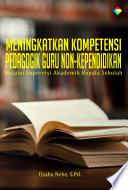
Best Practice, Peningkatan Mutu Pelayanan Pendidikan di Masa Pandemi Covid-19 Melalui Program Guru Kunjung dan Klinik Pembelajaran Di Kabupaten Jembrana Tahun 2020
Best Practice, Peningkatan Mutu Pelayanan Pendidikan di Masa Pandemi Covid-19 Melalui Program Guru Kunjung dan Klinik Pembelajaran Di Kabupaten Jembrana Tahun 2020
- ISBN 13 : 6239569615
- ISBN 10 : 9786239569617
- Judul : Best Practice, Peningkatan Mutu Pelayanan Pendidikan di Masa Pandemi Covid-19 Melalui Program Guru Kunjung dan Klinik Pembelajaran Di Kabupaten Jembrana Tahun 2020
- Pengarang : I Nyoman Wenten,
- Kategori : Education
- Penerbit : CV.MEDIA EDUCATIONS
- Bahasa : id
- Tahun : 2020
- Halaman : 38
- Google Book : https://play.google.com/store/books/details?id=rjUQEAAAQBAJ&source=gbs_api
-
Ketersediaan :
Best Practice, Peningkatan Mutu Pelayanan Pendidikan di Masa Pandemi Covid-19 Melalui Program Guru Kunjung dan Klinik Pembelajaran Di Kabupaten Jembrana Tahun 2020









